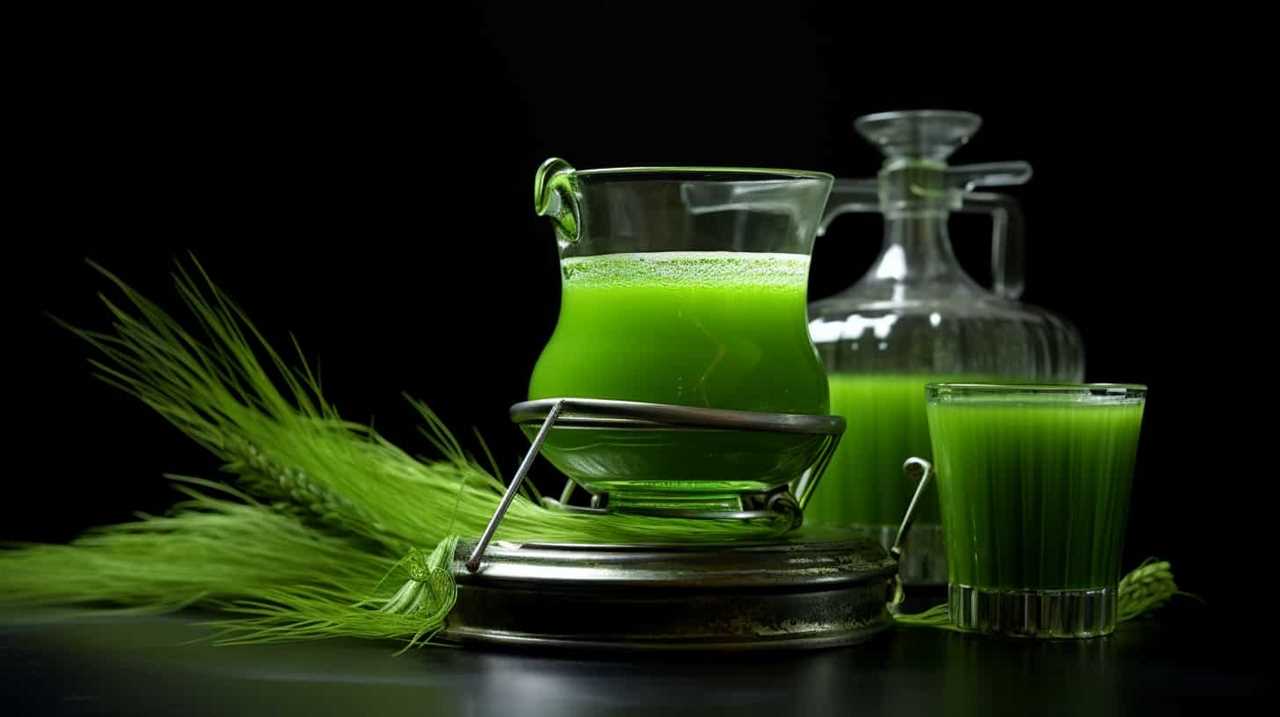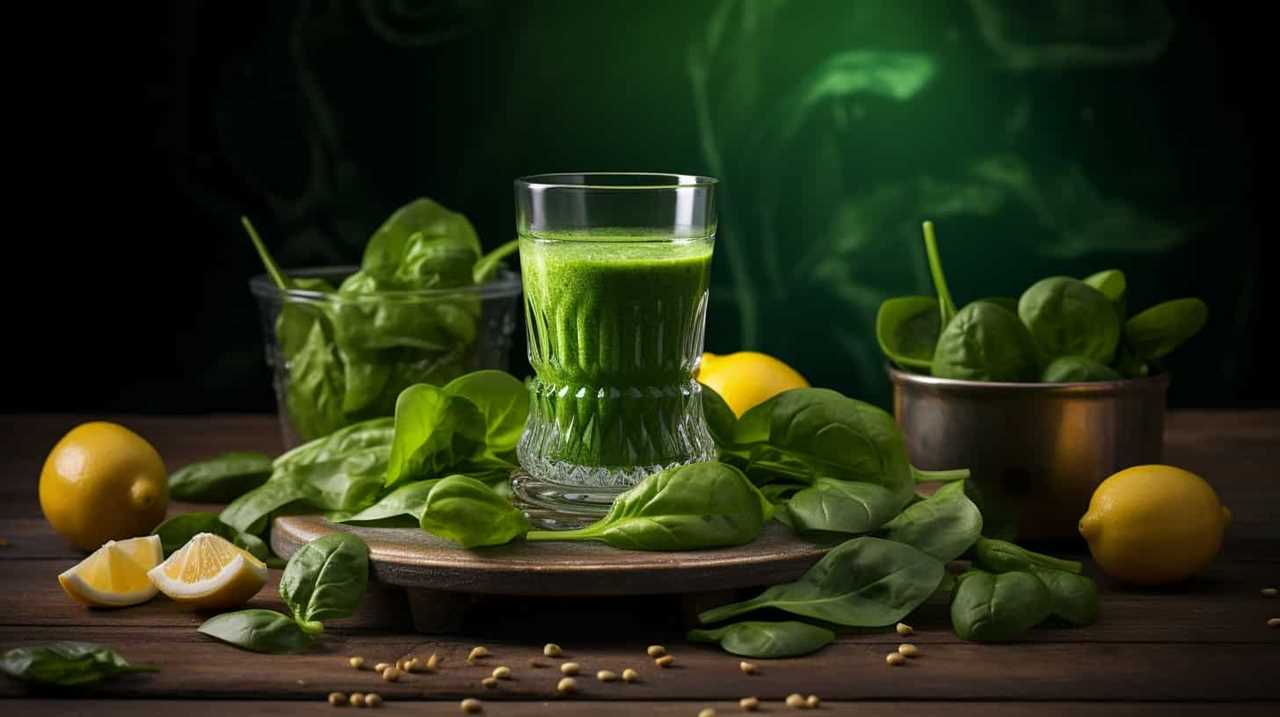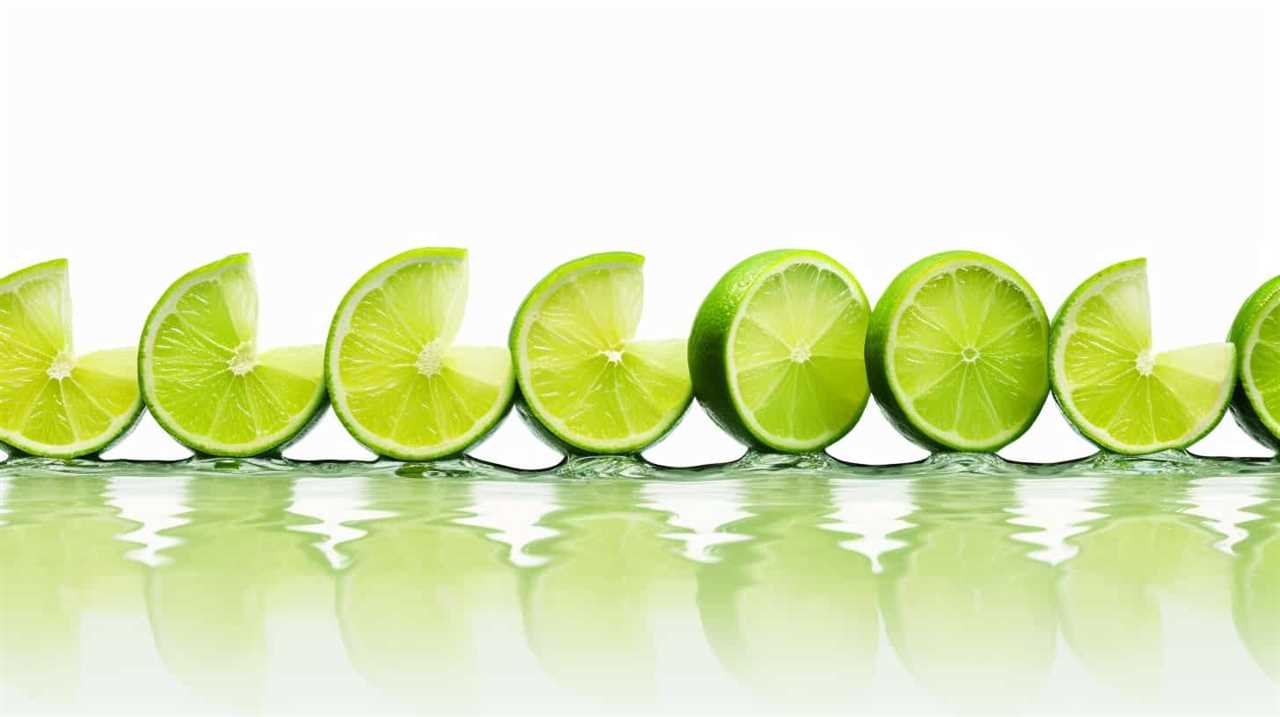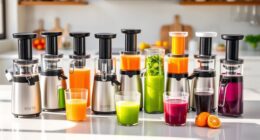We’ve got the scoop on the top 5 vegetable juices with low sugar content that will help you stay healthy and satisfied!
Did you know that consuming excessive amounts of sugar can lead to various health issues? Well, fear not, because we’ve done the research and found the best options for you.
From refreshing green vegetable juice to tangy tomato and bell pepper juice, these choices are packed with nutrients and low on sugar.
Get ready to quench your thirst and nourish your body with these delicious and guilt-free options!

Key Takeaways
- Green Vegetable Juice offers numerous health benefits, boosts the immune system, improves digestion, and promotes healthy skin.
- Carrot and Beet Juice are packed with health benefits, including improved vision, boosted immune function, reduced inflammation, and support for heart health.
- Celery and Cucumber Juice is refreshing and packed with health benefits, aiding in digestion, reducing inflammation, and promoting detoxification.
- Spinach and Kale Juice is packed with essential vitamins and minerals, supports heart health, lowers blood pressure, and boosts digestion.
Green Vegetable Juice
When it comes to low-sugar vegetable juice choices, one option that stands out is green vegetable juice. Green vegetable juice offers numerous health benefits and can be a great addition to any juicing recipe.
Packed with vitamins, minerals, and antioxidants, this juice can help boost your immune system, improve digestion, and promote healthy skin. The combination of leafy greens, such as spinach or kale, along with other green veggies like cucumber and celery, creates a powerful blend that’s low in sugar and high in nutritional value.
Green vegetable juice is also a great way to increase your daily intake of vegetables, especially if you struggle to eat them in their whole form.
Carrot and Beet Juice
Now let’s move on to another delicious and nutritious low-sugar vegetable juice option: carrot and beet juice. Drinking carrot and beet juice offers numerous health benefits. Carrots are packed with beta-carotene, which can improve vision and boost immune function. Beets, on the other hand, are rich in antioxidants that help reduce inflammation and support heart health. Mixing these two vegetables creates a vibrant and flavorful juice blend that can be enjoyed any time of day. Here are three simple recipes for carrot and beet juice blends:

| Recipe | Ingredients |
|---|---|
| 1 | 2 carrots, 1 beet, 1 apple |
| 2 | 3 carrots, 1 beet, 1 lemon |
| 3 | 2 carrots, 1 beet, 1 cucumber |
These combinations provide a perfect balance of sweetness and earthiness. Now, let’s dive into the next section about celery and cucumber juice.
Celery and Cucumber Juice
Moving on to the next low-sugar vegetable juice option, let’s explore the benefits of celery and cucumber juice.
Celery and cucumber juice isn’t only refreshing but also packed with health benefits. Celery is rich in antioxidants and contains vitamins A, C, and K, which support a healthy immune system and promote collagen production for skin health. Cucumber, on the other hand, is hydrating and contains essential minerals like potassium and magnesium. Together, these two vegetables make a powerful juice that aids in digestion, reduces inflammation, and promotes detoxification.
To make a delicious celery and cucumber juice, simply blend the vegetables with a splash of lemon juice and a handful of fresh mint leaves. This combination isn’t only tasty but also provides a refreshing and revitalizing drink.

Now, let’s move on to the next vegetable juice option: spinach and kale juice.
Spinach and Kale Juice
Let’s start our exploration of low-sugar vegetable juice options with spinach and kale juice. Spinach and kale juice offers a multitude of benefits for your health. Here’s why you should consider adding it to your diet:
- Packed with nutrients: Spinach and kale are rich in essential vitamins and minerals like vitamin K, vitamin A, vitamin C, and iron.
- Antioxidant powerhouse: These leafy greens contain powerful antioxidants that help protect your cells from damage caused by free radicals.
- Supports heart health: Spinach and kale are both known for their ability to lower blood pressure and improve cardiovascular health.
- Boosts digestion: The high fiber content in spinach and kale aids in digestion and promotes a healthy gut.
- Easy to make: To make spinach and kale juice, simply blend a handful of spinach and kale leaves with water and your choice of additional fruits or vegetables.
Incorporating spinach and kale juice into your daily routine can be a delicious and nutritious way to support your overall well-being.
Tomato and Bell Pepper Juice
One option for low-sugar vegetable juice is tomato and bell pepper juice. This refreshing and nutritious combination offers several health benefits.

Both tomatoes and bell peppers are rich in vitamins A and C, which are essential for a strong immune system and healthy skin. They also contain antioxidants that help protect against chronic diseases.
Tomato and bell pepper juice is a great source of hydration and can aid in digestion. It’s low in calories and high in fiber, making it a satisfying and guilt-free beverage choice.
Additionally, this juice can be used in delicious recipes such as gazpacho or as a base for marinades and sauces.
Incorporating tomato and bell pepper juice into your diet is a tasty way to boost your nutrient intake and support overall health.

Frequently Asked Questions
Can I Mix Different Types of Vegetable Juices Together to Create a Unique Flavor Combination?
Yes, we can mix different types of vegetable juices together to create a unique flavor combination. Combining different vegetable juices not only adds variety but also provides a wider range of nutrients and health benefits.
Are There Any Specific Health Benefits Associated With Drinking Low-Sugar Vegetable Juices?
There are specific health benefits to drinking low-sugar vegetable juices, such as improved hydration and increased intake of essential nutrients. It’s important to choose low-sugar options to avoid potential negative effects on blood sugar levels.
Can Low-Sugar Vegetable Juices Be Consumed as a Meal Replacement or Should They Be Considered a Supplement?
Low-sugar vegetable juices can be consumed as a meal replacement or a nutritional supplement. They provide essential nutrients and can help with weight management. However, it’s important to consider individual dietary needs and consult a healthcare professional.
Are There Any Vegetable Juices That Are Particularly High in Vitamins and Minerals?
There are vegetable juices that are particularly high in vitamins and minerals, making them great low-sugar juicing options. Incorporating these high vitamin vegetable juices into our diet can help us meet our nutritional needs. For example, spinach, kale, and carrot juices are excellent sources of essential nutrients like vitamin A, vitamin C, and potassium. These options are considered some of the best vegetable juices for nutrition, as they provide powerful antioxidants and help support overall health. By regularly consuming these nutritious juices, we can enhance our immune system and improve energy levels naturally.

How Can I Incorporate Low-Sugar Vegetable Juices Into My Daily Routine?
We love finding creative recipes for delicious and unique low-sugar vegetable juice blends. Incorporating variety is key to enjoying different low-sugar veggie juices in our daily routine.
Conclusion
So, there you have it – the 5 best low-sugar vegetable juice choices.
These options not only provide a boost of essential nutrients but also keep your sugar intake in check.
From the vibrant green vegetable juice to the refreshing celery and cucumber juice, there’s something for everyone.

But the question remains: which one will you choose to incorporate into your daily routine for a healthier lifestyle?
Susannah expertise lies in researching and compiling evidence-based content on juicing, nutrition, and overall health. She is committed to ensuring that The Juicery World offers accurate, up-to-date, and trustworthy information to empower readers to take control of their health. Susannah’s goal is to inspire individuals to embrace juicing as a way to nourish their bodies and live their best lives.

















